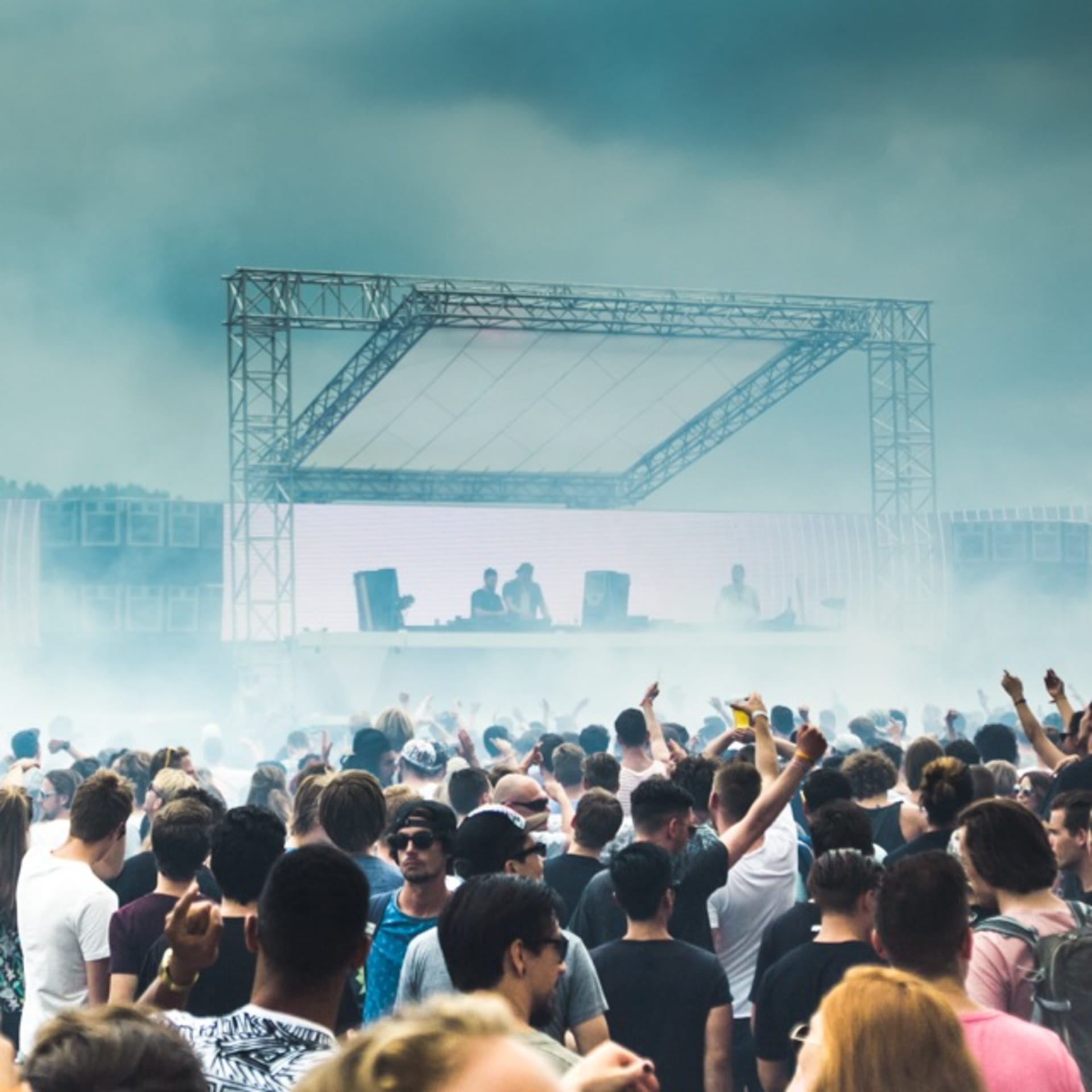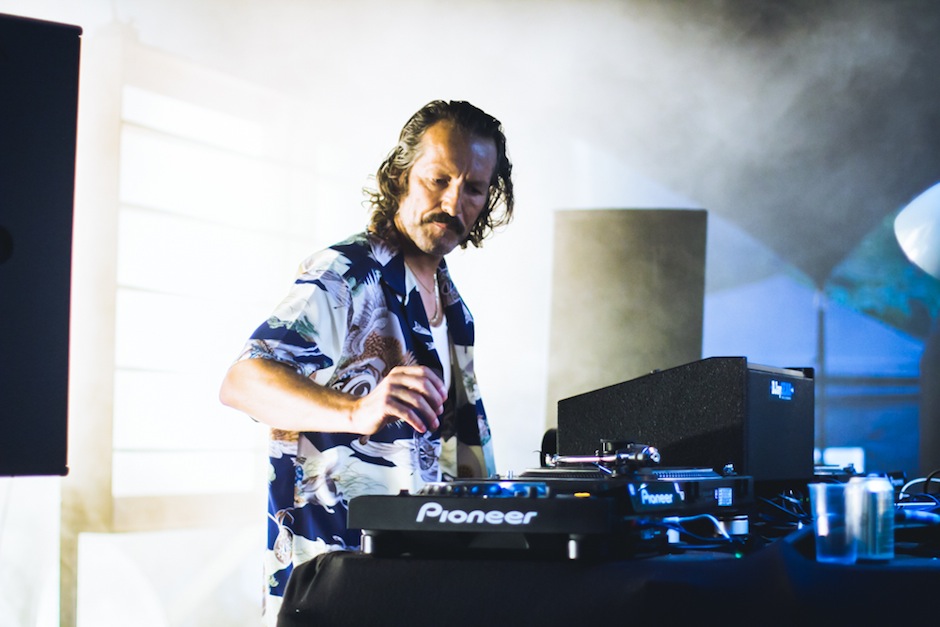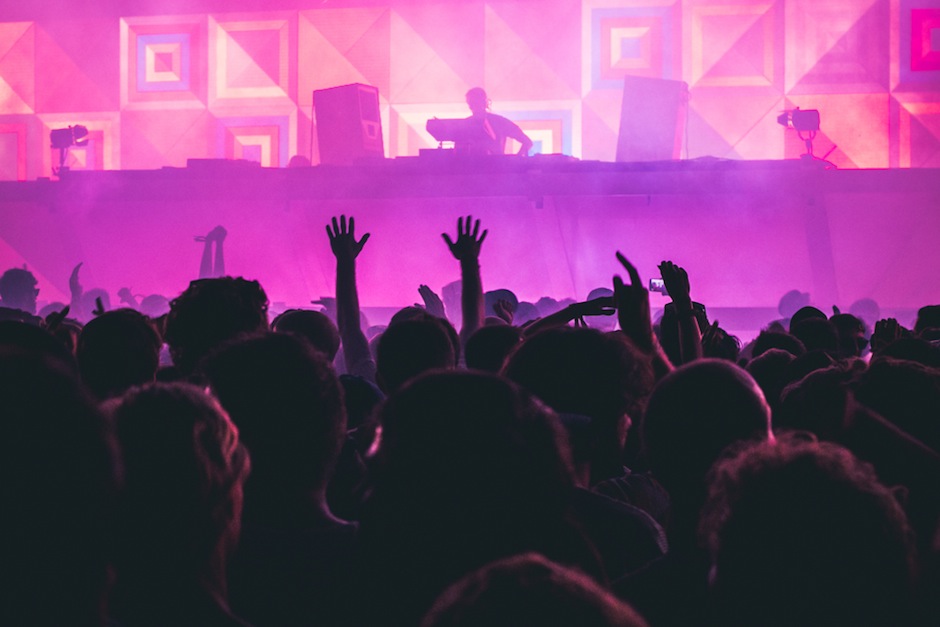
Drunk On Vibes: Dekmantel Festival reviewed
All photos by De Fotomeisjes.
Back and bigger than the 2013 event, Dekmantel Festival’s second edition has lost none of its singular atmosphere, says Lauren Martin.
Surveying the electronic music festival landscape of 2014, regulars and newcomers alike are met with a daunting selection. The Croatian coastline practically needs a holiday from itself, once niche European festivals like Sonar are now solid commercial enterprises, and the awkward pre-teen of US EDM has beefed out into a relentless juggernaut that functions not as a continuation of, but a conscious removal from club culture; queue here, pay fifty dollars for an Avicii shirt, “Be part of something, man”. Unless you refuse to ever leave your local techno bunker, you’ve likely spent some time this summer choosing which three-day endurance test to throw your money at and, with myriad options and only a few (at a financial stretch) choices to make, it’s the pretty young things full of promise and surprise, like Amsterdam’s Dekmantel, that really get the people excited.
Having attended its first year and been overwhelmingly impressed—tight organization, a killer line-up, a beautiful setting and a relaxed yet enthused atmosphere—we wondered less how the Dekmantel Soundsystem would execute this year’s event with the same fervor, and more if it would retain the magic of discovery that had made last year so memorable. Having (rightly) been given unanimously glowing reviews for 2013, there was every chance that 2014 could have been smothered by the British swarm that Croatia and Spain seem at the mercy of, and transform the Amsterdam Bos into a side-eye inducing weekend of tripping over laughing gas canisters, and inwardly pitting shufflers against one another.
News that there were to be nearly twice as many attendees as the year before instilled some concern, too. What made 2013 such a well-rounded experience was its conceptual framing: a graduation from a respected clubbing ethos to a weekender that could take its loyal following with it, and all without eroding an established music policy. The overwhelmingly Dutch crowd—chilled out, stylish and enthusiastic—made our presence feel like a welcome absorption into a native club event rather than a commercial tourist trap, so with such international exposure and promised expansion, we were going in with high hopes yet one eye half shut.
Within minutes of returning to the site, though, we smiled in relief. Despite the increase in capacity the site was almost exactly the same as the year before, yet it still managed to feel spacious. The open-air Resident Advisor main stage, with its wraparound LED screens and exposed soundsystem, looked elegant and sounded clear. This was the club taken into the open, without the overwrought theatrics of many of its contemporaries.
Last year’s RBMA tent had been moved adjacent to the main stage and was now this year’s XLR8R tent, too. With the two largest areas greeting you on entry, you were free to explore the further edges of the site: the narrow corridor of the Warnsteiner Selectors stage, with its overhanging willow trees creating a sun-speckled canopy; the addition of the wooden-decked RBMA area, which felt like a casual rooftop party lowered into a forest; and the return of Boiler Room, arranged in a woodland corner with its own bar and a more exposed view than last year’s lively yet cramped tunnel. Each stage was designed to look and feel different from its neighbor, which created a necessary visual contrast and sense of intrigue within such a small site.
As the bodies poured in throughout the Friday afternoon, it became apparent that the core Dekmantel crowd remained intact, too. Sure, there was a marked increase in British attendees on last year—floral headbands, hot pant under-butt and waxed chests appeared as standard, hyper-aggressive shuffling to Karenn perhaps less so—but the continued pull of the locals and the 1 p.m. until 11 p.m. schedule meant that the party never visibly tipped over into tourist-centric messiness. With previous concerns about scale and quality quashed, then, we dived straight in.
For a festival heavy on kick drum techno madness, Friday’s line-up was a varied offering that eased us into the spirit of things. Braiden’s early afternoon set at the RBMA stage saw him in a playful mood: the spirited groove of Moodymann’s “The Third Track” and Debbie Jacobs’ sultry disco classic “Don’t You Want My Love” sharpened our shoulders, and confirmed that he’s one of the UK’s finest yet largely underrated DJs. Like Genius of Time’s dreamy acid track “Juno Jam”, Jacobs’ anthem was heard time and again across the weekend. It conveyed a mood of low-key luxury that rang loud and clear in Canadian label Mood Hut’s excellent selections of deep house, R&B and disco—all punctuated by their flailing limbs and heart-warming sing-alongs, which we duly joined in with. For brief respite amongst it all, we lay on the grass over at the main stage as Magic Mountain High’s improvisational set strung out acid lines into distorted, techno freakiness. These more chilled offerings built upon one another right up until the first of the weekend’s superstars, DJ Harvey, who stood firm behind the willow trees of the Selectors stage.

DJ Harvey is, in short, a sexy beast. With each seamless transition a sly grin ripped across his face, and his notorious “Bask in my glory, fuckers” attitude waved over us as we stamped down hard and (quite literally) swung from the trees to his rapid-fire selections of deep house and classic disco. Paul Woolford’s massive piano-led hit “Untitled” sitting comfortably alongside TC Crew’s “I Can’t Do It Alone” left us mentally squirming; trying to lock every last blend into our artillery for the next “house party rescue” moment.
With the groove of the day at fever pitch we closed with Jackmaster and Oneman’s Can U Dance project: bodies doubling up towards the sky as Numbers classics like Piddy Py’s “Giggle Riddim” were blasted out to the liveliest, most obviously British crowd of the night. Double and triple acts populate Dekmantel—the poorly named but worthwhile Talaboman, the superstar majesty of 3 Chairs and the militancy of Answer Code Request and Steffi’s b2b set, to name a few—but what makes Can U Dance a well-placed festival prospect is the feeling that this was born of friends who finish each others sentences so often that they figured they should finish each others blends, too.
Saturday saw both Dekmantel and the crowd put to the test, however, with the gloomy promise of an electrical storm. Jay Daniel and Kyle Hall’s skilled set was cut short only half an hour into its allotted two hours, and the crowd were packed in as the back three stages were shut off until 6 p.m.. Concern rippled through the crowd as the sky turned a foreboding blue-ish gray, but the close quarters meant that two of the finest sets of the festival were met with a generous audience.
Joey Anderson’s signature style is at the druggier end of the current crop of esoteric house music: raw in production yet languid in delivery, his set swelled with power and curious heads turned in approval with each rising holler. The tent was heaving half an hour in and by the time the last drone teased itself out, the crowd were rapturous in their applause. Anderson was visibly humbled by the experience, but having been taken into the Dekmantel fold with this year’s superb debut LP After Forever, those who knew him well showed little surprise for how natural the two-hour event felt.
As the air thickened, those who stuck it out were rewarded with Shackleton. Years after boiling down the organs of Skull Disco into his polyrhythmic swarm of glacial shatterings and tribal wails, this unassuming Yorkshireman stands alone in a modern echo chamber of his own making. The insistence of his live set held such a foreboding command over the crowd that it felt as if he was drawing on the storm warning, as the close heat prickled with every new, intricate sequence. With the crowd left dripping by the set’s close, it was apparent that, throughout dubstep’s decade of mutation, Shackleton remains a monumental figure. Between himself and Anderson, those three heady hours inside a baking festival tent were Dekmantel’s knowing nod to club culture proper: sweat it out, or get out.
It was a sentiment that went full throttle on the last day, too. Typically, the Sunday of a festival is when the trolls roll onsite late in the day, weary from their regime of stage-hopping and hangovers, but Dekmantel’s Sunday was their finest of the three line-ups, and when the joy of techno music manifested in collective rapture. Marcel Fengler and Efdemin’s early set had the XLR8R tent pumping barely past lunchtime and, as much as DJ Harvey’s full-throttle mania got us hyped only a couple of nights before, Ben UFO’s humble demeanour in the same stage made his execution all the more inspiring. Although praise for Ben UFO isn’t exactly in short supply, it would be amiss to recount this year’s festival without a love letter to his craftsmanship and encyclopedic knowledge: working the “Applause Riddim” (Sizzla’s “Run Out Pon Dem”), Dat Oven’s “Icy Lake” and a garage remix of Aaliyah’s “Are You That Somebody” into the space of ten minutes with a playful sincerity that renders him a unique prospect.
By the late afternoon, the crowds were less fresh, more drunk on vibes. Young Marco and Motor City Drum Ensemble’s outings at Boiler Room were inspired journeys through soul, disco, house and just about every noodling strand in between, and the crowd sing-along when Motor City Drum Ensemble dropped Marvin Gaye’s “Ain’t No Mountain High Enough” made the weary believers again. Karenn’s rescheduled set on the RA main stage was the most disgusting display of militant, nosebleed techno—an hour long screw face punctuated with screams of “fucking heeeeell”—but not even they could warm up the kick drum for Robert Hood, who executed the set of the festival without breaking a sweat. This was a warm, deep, rich, relentless display of techno music that once again confirmed his status as a true master. Listening to and dancing to of all of this was a crowd who I never once hear make a genuine complaint about sound quality, track selection, artist appearances or organization, instead sprinting between stages so as not to miss a single track from their underground heroes. Dekmantel was rattling through superstars with fervor and by the time Jeff Mills basked in the pink and orange glow of the RA main stage for its close, this small crew of Dutch club promoters had ten thousand people in the palms of their hands.

For those strong-willed enough to make it to the official after-parties, Trouw was the club where clothes went to drown and minds were wrung out by JD Twitch and JG Wilkes, aka quasi-regal DJ duo Optimo. Having closed the Selectors stage the same night, they barely had time to breathe before jumping into the DJ pit of Trouw’s mammoth upstairs corridor-room, and smacking the thousands-deep crowd with a relentless selection including Debbie Jacobs’ “Don’t You Want My Love”. With the news that Trouw is to close in 2015, the collective imperative to experience Trouw in all its immersive glory was all the more pressing, and hearing Jacobs’ cries for love rattle off the dampening concrete walls confirmed just how neatly Dekmantel had this entire weekend tied up. It’s no small feat for a small crew of local club promoters to start up a festival of niche electronic music, but to sell it out and execute it to unanimous acclaim has quickly crowned them hometown heroes. Thank you, Dekmantel. I can still hear Debbie now. ~
Published August 07, 2014. Words by laurenmartin.
